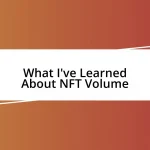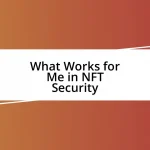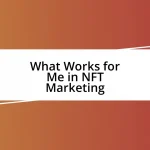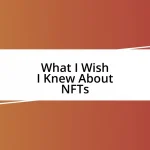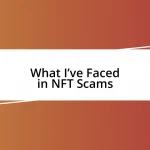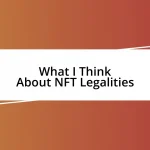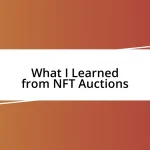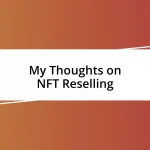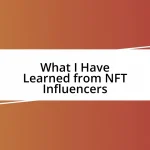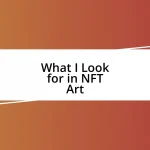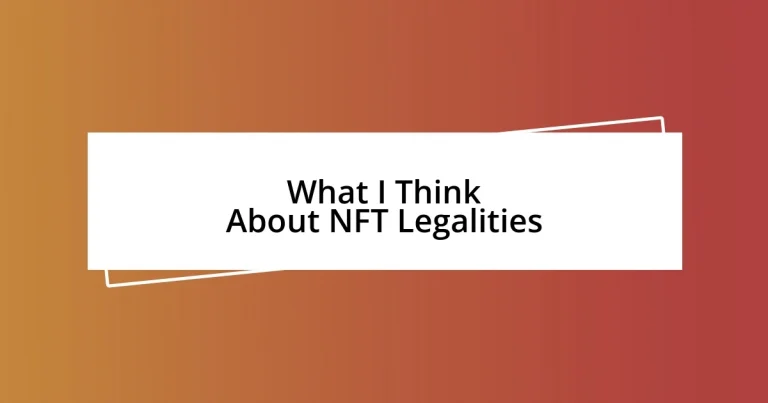Key takeaways:
- The complexity of NFT legal frameworks varies globally, emphasizing the need for robust legal literacy among artists and collectors to prevent misunderstandings regarding ownership and copyright.
- Current legal issues, including copyright concerns, fraud, regulatory uncertainty, consumer protection, and tax implications, create challenges for NFT creators and buyers, highlighting the importance of informed engagement in the marketplace.
- Future trends may involve stricter legislation on intellectual property rights, greater transaction transparency, and adapted AML regulations to address the unique challenges of NFT markets, ensuring trust and sustainability in the digital asset space.
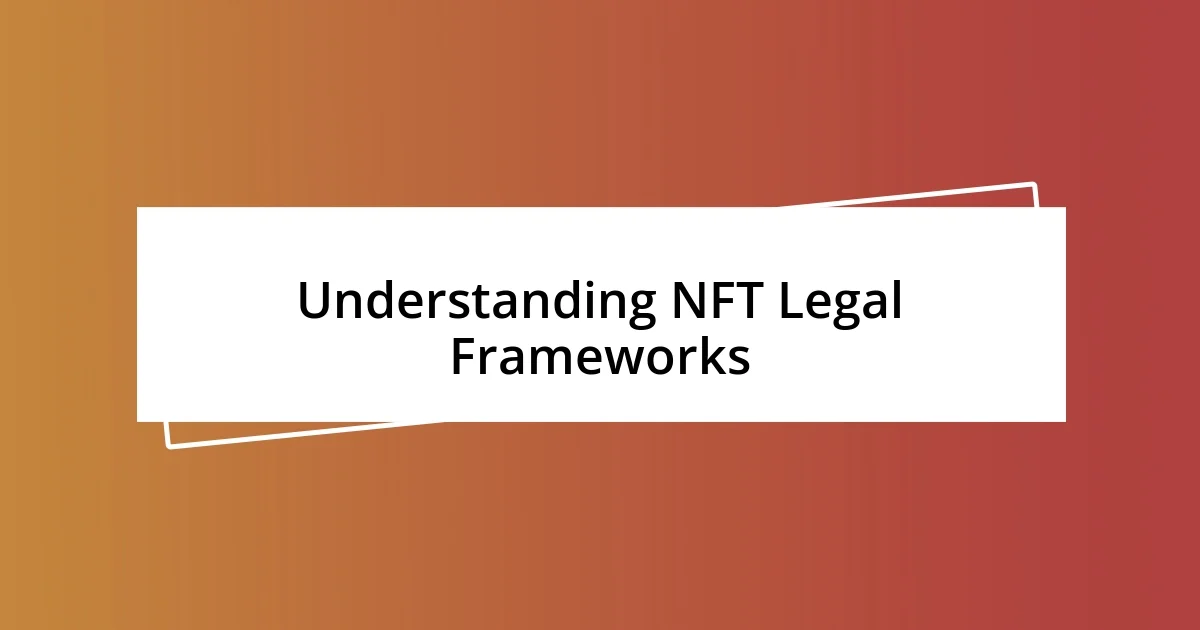
Understanding NFT Legal Frameworks
Navigating the legal frameworks surrounding NFTs can feel a bit like wandering through a maze. When I first started learning about NFTs, I was overwhelmed by the complexity of intellectual property rights, contract law, and digital ownership. It’s fascinating—and a bit disconcerting—that the laws aren’t standardized globally; each country often interprets these digital assets differently.
One aspect I find particularly intriguing is the ever-evolving definition of ownership in the digital space. Imagine purchasing an NFT, only to realize that the underlying copyright remains with the original creator. It raises questions like, “What does owning an NFT really mean?” From my experience, many collectors don’t fully grasp the distinction between owning the token itself and the rights it may—or may not—convey. This misunderstanding can lead to disputes, which only highlights the importance of clear legal guidance.
I remember a conversation I had with a fellow enthusiast who faced legal challenges when reselling an NFT. It was a stark reminder that as this space matures, so too does the need for robust legal literacy among artists and collectors alike. Engaging with these legal frameworks isn’t just crucial for protecting one’s investments; it’s also essential for fostering a sustainable and trustworthy market for digital assets.
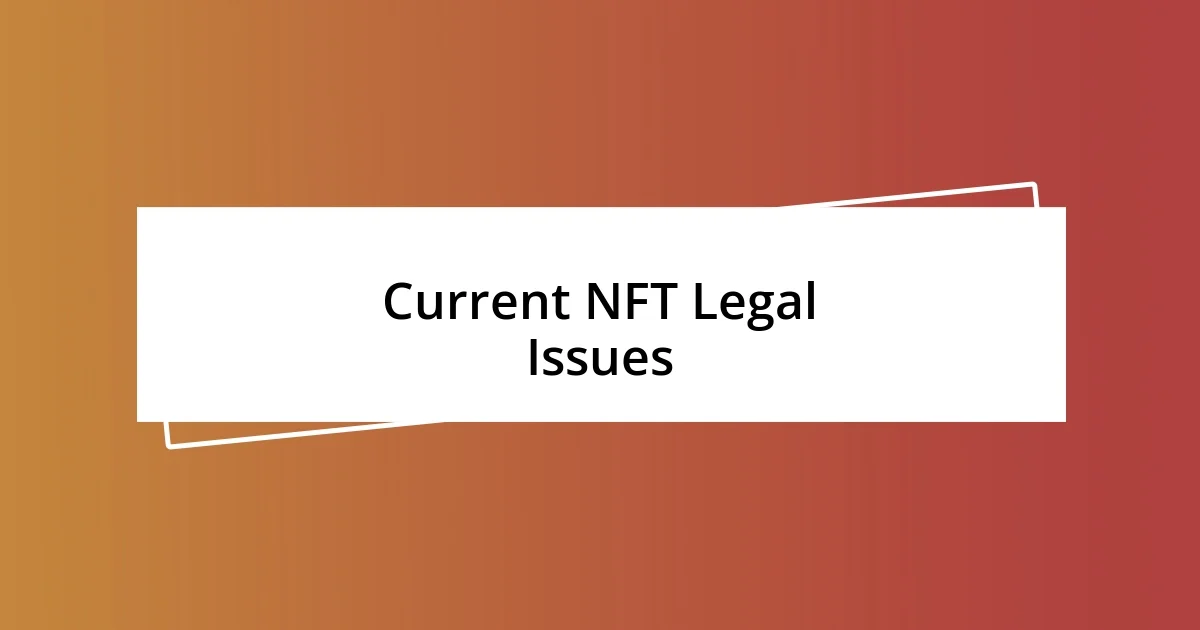
Current NFT Legal Issues
Current NFT legal issues can evoke a sense of uncertainty and urgency. For instance, I’ve seen how the lack of regulatory clarity can confound creators and buyers alike. One day, I was discussing projects with a friend who had just created his first NFT collection, and he was shocked to learn that copyright issues could derail his success. This highlights how everyone in the NFT space, from creators to collectors, often grapples with the implications of copyright infringement and other legal pitfalls.
Here’s a quick look at some pressing legal issues surrounding NFTs:
- Copyright Concerns: Artists sometimes unknowingly infringe on existing copyrights when creating NFTs.
- Fraud and Scams: As the popularity of NFTs grows, so does the potential for fraudulent schemes.
- Regulatory Uncertainty: Variations in laws across jurisdictions lead to confusion about the legal status of NFTs.
- Consumer Protection: Buyers often lack clarity regarding their rights when purchasing NFTs, which can lead to disputes.
- Tax Implications: The taxation of NFT transactions is still a gray area, complicating financial planning for artists and collectors alike.
I’ve encountered multiple discussions centered on these issues, and they certainly add to the unease I feel about the future of digital ownership. It’s crucial to stay informed and vigilant in this evolving landscape.
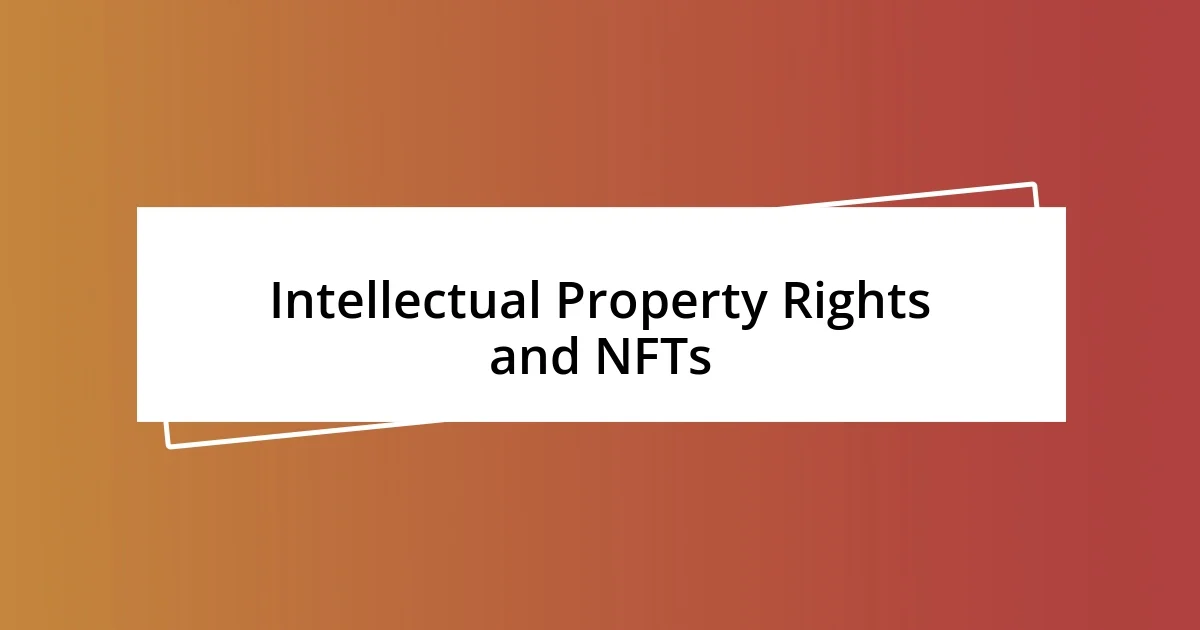
Intellectual Property Rights and NFTs
Navigating intellectual property rights in the context of NFTs is a challenging endeavor. I recall attending a virtual art conference where an artist passionately discussed her frustrations with NFT sales, realizing that owning the NFT didn’t grant buyers any rights to reproduce her work. It struck me that many individuals jump into the NFT market without fully understanding these nuances, and it made me wonder how many potential disputes could arise simply from this misunderstanding.
When creators mint an NFT, they often assume that they are relinquishing all rights, yet this is rarely the case. I remember a late-night chat with a fellow NFT enthusiast, where we uncovered the intricacies of licensing agreements. It became clear that while NFTs can grant certain rights, they typically don’t transfer copyright unless explicitly stated. This distinction is vital; collectors sometimes expect to use their purchased digital art in various commercial ways without realizing they could be infringing the artist’s copyright.
Understanding these intellectual property rights is not just an academic exercise—it’s a real-world necessity. I think back to when I was helping a friend sell his NFTs. He was excited to market his digital artwork but overlooked the importance of a clearly defined copyright term with his buyers. This oversight could have led to serious legal trouble. Engaging with these rights protects not only the creators but also the collectors, ensuring a respectful and sustainable marketplace.
| Aspect | Details |
|---|---|
| Ownership | Owning an NFT often does not come with copyright or reproduction rights. |
| Licensing Agreements | Creators need clear terms that define what rights are transferred with the NFT. |
| Legal Precedents | Legal cases involving NFTs and IP rights are emerging, but outcomes are inconsistent. |
| Creator Protection | A well-defined IP strategy can safeguard artists against unauthorized use of their work. |
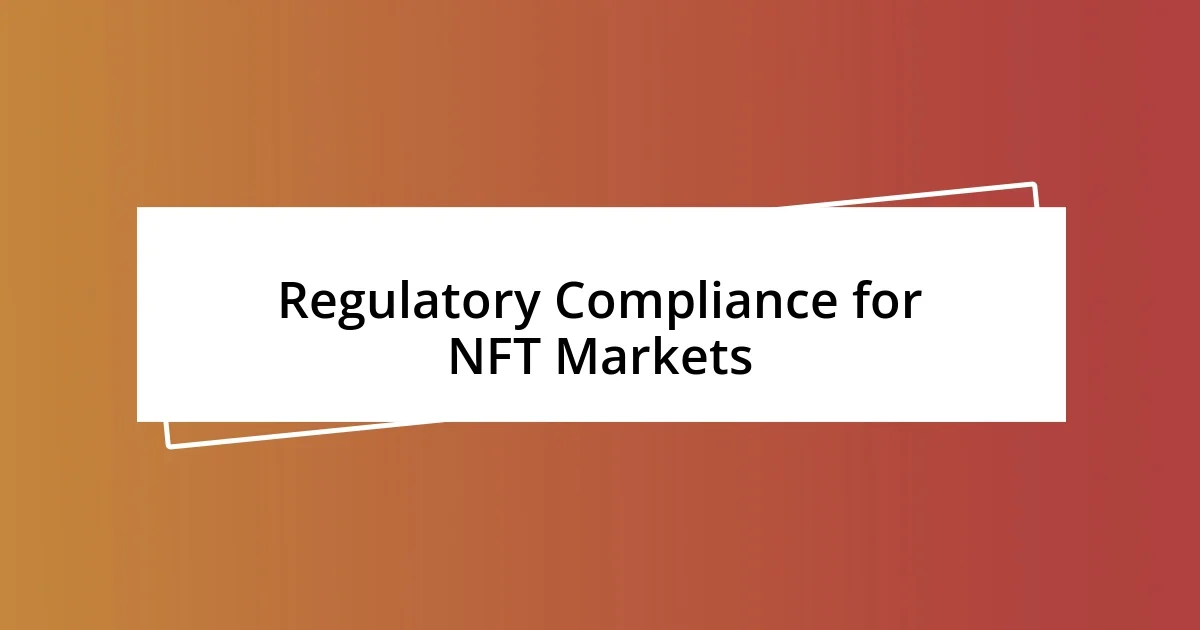
Regulatory Compliance for NFT Markets
Regulatory compliance in NFT markets is an intricate web that creators and buyers must navigate carefully. I vividly recall a conversation I had with a colleague who was eager to launch his NFT venture but was perplexed by the patchwork of regulations. He wondered, “How can I ensure my project aligns with various laws?” This uncertainty can create roadblocks for many enthusiasts trying to enter the space, highlighting the need for clear guidance.
Interestingly, as NFT marketplaces proliferate, so do the compliance requirements. I remember feeling overwhelmed when I first learned about AML (Anti-Money Laundering) and KYC (Know Your Customer) regulations being applied to NFT transactions. These measures aim to prevent fraud and protect consumers, but they can feel burdensome for new creators. I believe it’s essential for participants in this market to stay informed and develop a proactive approach to compliance. If we don’t address these regulatory challenges, we risk creating a marketplace that’s fraught with pitfalls.
Moreover, the global nature of NFT transactions adds another layer of complexity to regulatory compliance. Reflecting on my own experiences, I found it astonishing how different countries interpret NFT legalities differently. For instance, could a single NFT be subject to multiple regulations depending on where it’s sold or who owns it? This question has profound implications for potential buyers and sellers. A thorough understanding of these variances is critical for anyone looking to thrive in this rapidly evolving marketplace.
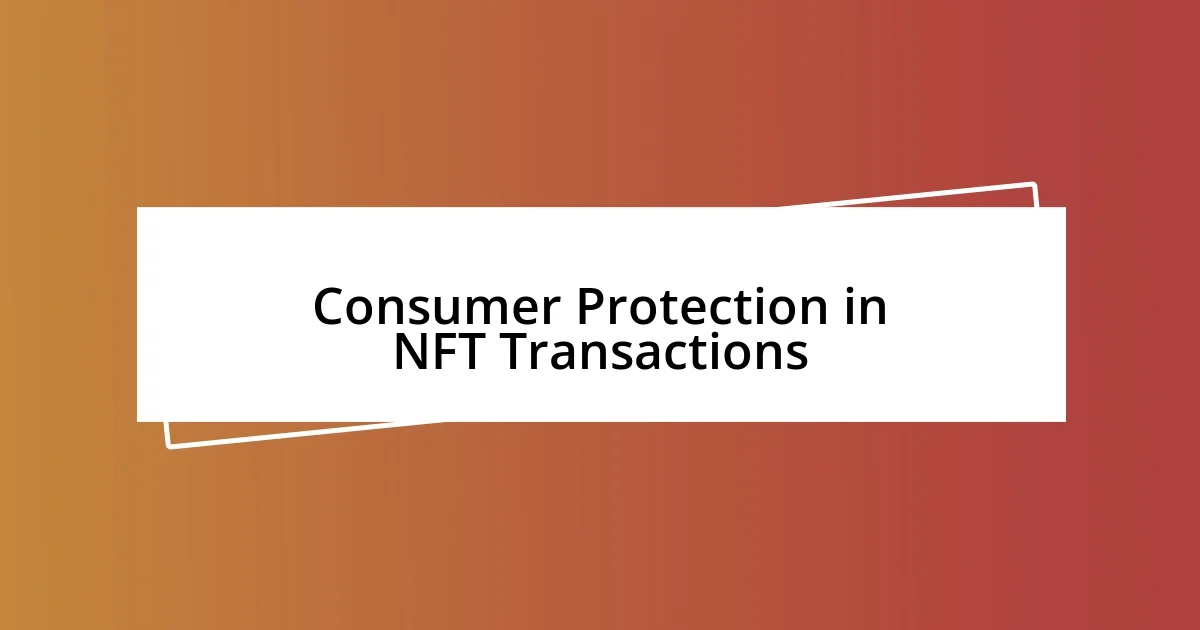
Consumer Protection in NFT Transactions
When it comes to consumer protection in NFT transactions, I often reflect on the overwhelming nature of the NFT landscape for new buyers. One time, a friend excitedly showed me an NFT he purchased, believing it was a foolproof investment. However, I quickly realized he hadn’t considered the lack of consumer safeguards in the space. Many buyers expect the same protections as traditional art purchases but are often left in the dark about what recourse they have if things go wrong.
I still remember scrolling through a marketplace, noticing a baffling absence of standardized policies regarding refunds or disputes. It made me wonder: how can buyers feel secure in this emerging space? With transactions happening at lightning speed, the potential for fraud is a real concern. Consumers need to prioritize platforms that offer transparency and support in case of scams, but unfortunately, many aren’t adequately educated on these aspects.
In my own experience, I stumbled upon an NFT project that promised extraordinary returns, only to find out it was essentially vaporware. That experience shook my confidence and drove home the importance of comprehensive vetting and due diligence. I firmly believe that platforms must establish clearer consumer protection measures to cultivate trust and safety in NFT transactions, allowing buyers to invest without the cloud of anxiety shadowing their decisions.

Best Practices for NFT Creators
As I delve deeper into the world of NFTs, I consistently encounter a common pitfall among creators: the importance of documenting their work. I recall when I released my first digital artwork as an NFT, the lack of thorough documentation led to misunderstandings about ownership and usage rights. I swiftly learned that establishing clear terms around intellectual property can save a lot of confusion and potential disputes down the line. How can creators confidently navigate this complex landscape without a solid framework to guide them?
Another vital best practice is engaging with the community. One time, I joined an online forum filled with budding NFT creators who were eager to share their experiences, challenges, and insights. The camaraderie and support within that group were incredibly uplifting, and it sparked valuable discussions around best practices and innovative approaches. By actively participating in such communities, creators not only learn from each other but also build a network of trust. It makes me wonder how many talented creators miss out on this collaborative spirit by staying in isolation.
I also think it’s crucial for NFT creators to embrace a transparent approach about their processes. For instance, I vividly remember a project I followed closely; the creator shared regular updates about the development and thought process behind their work. This openness fostered a sense of connection and authenticity that kept me engaged throughout. I can’t help but ask: doesn’t a transparent process elevate the value of the art itself? In my experience, being upfront about one’s journey can resonate deeply with potential buyers and ultimately enhance the marketability of the NFT.
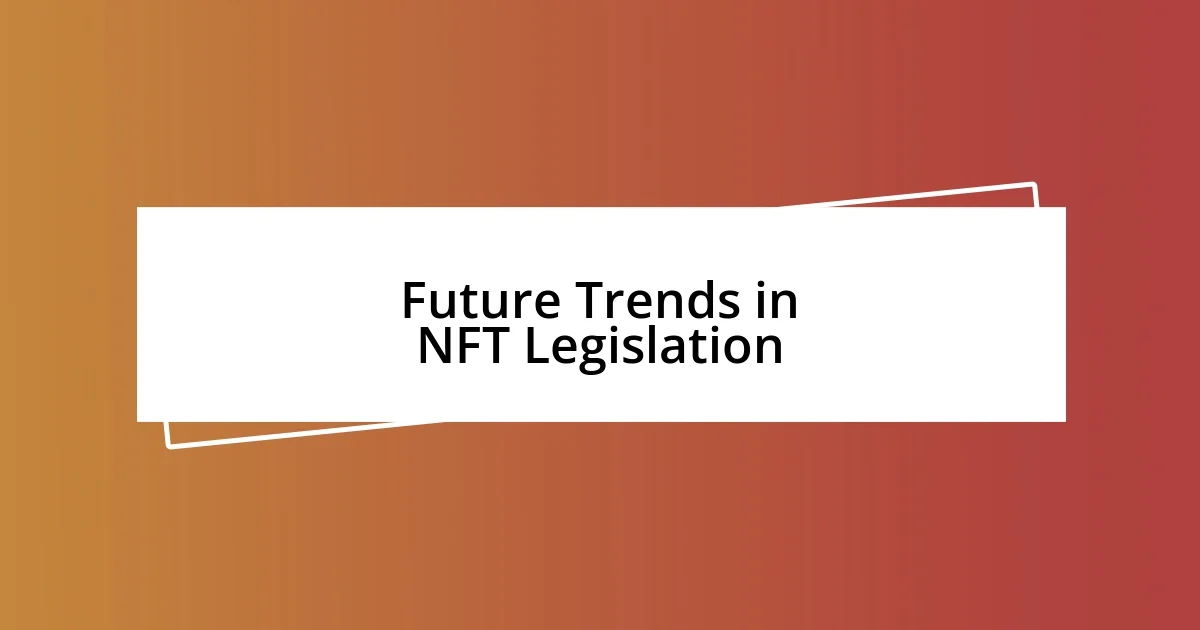
Future Trends in NFT Legislation
As I think about the future of NFT legislation, one trend that stands out is the increasing attention regulators will give to intellectual property rights. I recall the excitement I felt when I first minted an NFT, only to question who truly owns the content behind it. With the rapid adoption of NFTs, I anticipate lawmakers will need to clarify and strengthen copyright protections, ensuring creators receive the recognition and compensation they deserve. How can we establish trust in a market that blurs the lines of ownership?
Moreover, the potential introduction of specific guidelines for transaction transparency is on the horizon. I remember a particularly jaw-dropping moment when I bought an NFT, blissfully unaware of the fees and royalties attached to secondary sales. I believe future regulations will likely require platforms to be upfront about these costs, fostering a more informed buyer base. Isn’t it essential for buyers to fully understand the financial implications of their purchases?
Finally, I see a future where anti-money laundering (AML) regulations are adapted to the NFT space, similar to existing laws for cryptocurrencies. After all, I couldn’t help but notice an unsettling pattern of larger, anonymous transactions during my NFT pursuits. As these digital assets become more mainstream, lawmakers will prioritize creating a framework that minimizes illicit activities. It raises an important question: how do we protect the integrity of this emerging market while still encouraging its growth?
